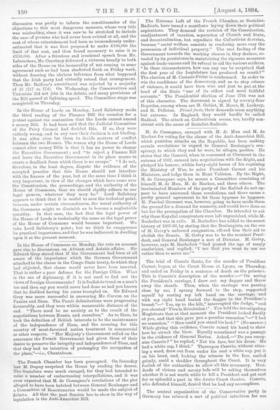M. de Cassagnao, enraged with M. de Mun and M.
de- Mackau for voting for the clause of the Anti-Anarchist which punishes attacks on the Republic, has been making certain revelations in regard to General Boulanger's con- spiracy, to which they and he were, he alleges, parties. He states that the General, when in command at Clermont in the autumn of 1887, entered into negotiations with the Right, and pledged his honour, within forty-eight hours of his regaining the Ministry of War, to seize President Carnot and his. Ministers, and lodge them in Mont Valerien. By the Right, M. de Cassagnac says, he means a Committee consisting of' himself, M. de Mun, M. de Maokau, and three others. The incriminated Members of the party of the Rallied do not ap- pear to have answered these revelations, and there seems a pretty general agreement to let these bygones be bygones. M. Paschal Grousset was, however, going to have made them the ground for a demand for amnesty, and would have done se but for the prorogation of the Chamber. He intended to ask why these Royalist conspirators were left unpunished, while M. Rochefort was in exile. M. Rochefort has added to the secret history of 1887-88, by stating that the Boulangists, on the eve of M. Grevy's enforced resignation, offered him their aid to- abolish the Senate. M. Grevy was to be the nominal Presi- dent, and General Boulanger a sort of Dictator. M. G-revy, however, says M. Rochefort "had passed the age of manly'' resolutions, and replied, I see that you want to use me rather than to serve me.'"


































 Previous page
Previous page